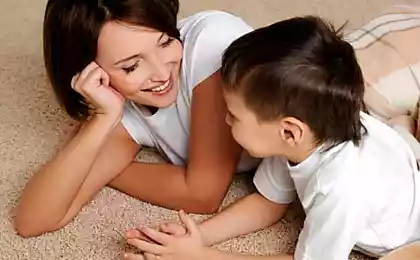319
Katerina Murashova: How to Stop Being Irritated and Befriend Your Child
How to put children to bed without screaming, the rules of behavior with tantrums, what to do if the grandmother criticizes the mother, and what to do if you break down on the child?
Psychologist Katerina Murashova answered the questions of parents, asked during the lecture “How to stop irritating and start friends with your child”.

All the psychologists I’ve heard say you should be happy with children’s drawings, and you think you can and can’t. When and how can you stop being happy? When do I tell my child what I really like?
Right away! The Americans conducted a study where they found that the child is able to read the emotional state of the mother and change his mood to read 4 hours after birth! A newborn baby can somehow read our emotions.
A child doesn’t need false feelings: “Oh, well done, what a good drawing,” if you already have these drawings there. You are a real person, there are things you really like. If you come from work and the child brings you slippers – you are happy! Well, explain it to him, give him positive feedback on the slippers. We have a child who can speak three languages and take on integrals, with little or no instruction in what we call emotional life.
Question: I am the mother-duck you mentioned, the mother who leads the child. But I have a problem: grandparents. They communicate with the child incorrectly, as it seems to me – the child leads them, and not vice versa. Wouldn’t a child see this kind of incorrect relationship as normal?
If you don’t live with your grandparents, it’s okay. You do everything you want, you have boundaries, you have rules. When a child falls into the field of grandparents, everything changes there, but it is absolutely not scary. If they criticize you, don’t argue with them! Let them do what they want, and you keep bending your line.
If your life is arranged in such a way that your grandmother comes when you are not there, your child will learn to switch. As with the kindergarten, the kindergarten is very different rules than at home, but the child easily switches. The main thing is to be consistent. The child should know for sure that the mother allows it, it forbids and always like this. It can be completely different with Grandma, that's normal. And as a norm, he will absorb what parents give, definitely.

What if the disagreement is not between mom and grandma, but between mom and dad?
That's a whole other story. When mom and dad disagree, it’s not like mom and grandma. If the mother says one thing and the father says another, it affects the nervous system of the child. First, it does not set boundaries. Second, it exhausts its resources, its adaptation mechanism. If mom says “I won’t give” and dad says “let him be quiet” – that’s wrong. We should try to negotiate. Where compromise is possible, we seek compromise.
Example: My mother read that if children paint on walls, it liberates their individuality. She told the kids about it and even bought paint. And then it turned out Dad was against it. What do I tell the kids? Compromise can be like this. Dad says to his mother, “Here is one wall and you glue the wallpaper on it yourself.” Mom and Dad say to kids, "Here's a wall, you can draw on it." Will children try to paint on other walls? Sure! But mom and dad are going to get a tank on them. And if the wall isn't glued in time, Dad's gonna run into Mom.
If a compromise has not been found, and one of the parents has already banned or allowed - what to do? Who got up first, the slippers. That is, you agree with the decision of the first parent, and in the evening you try to work out a common position.
Who has to adapt to whom? You say that the child must adapt to the world where he is. But here, for example, the mother before pregnancy led a lifestyle in which the child does not fit. When a child is born, does the mother change her life, so she adapts to the child?
You can fit a baby everywhere! When I was young, I worked in a chapito circus. I have never seen anything more amazing than circus people. Circus children enter the arena at the age of four, they perceive physical pain very differently, they use very little of the words "please" and "thank you." I did not see any education in the usual sense. The life of the circus is divided into three parts – sleep, rehearsals and performance. All. In spite of all this, these children grow up to be absolutely normal people. You know why? Because they see so many people passionate about their profession.
No, no, everything remained as it was – a child comes into this world without knowing where he went and he has to adapt to what will be there.

- I work a lot in the evening. My oldest child is 10 years old and often stays with younger, 8 and 6 years old. He can do anything – cook food, wash dishes and so on. But recently he wrote me a note: "Mom, we're doing well, but we've been missing you a lot lately." Is that a wake-up call?
It's not alarming, but a signal. And you have to show that you heard him. First, show your child how much you value him. What you love is understandable. Tell him that you appreciate what he does for you. Because he doesn't have to babysit, actually. Second, show them that you heard that particular signal. “You wrote, I heard you. I will think I can.” And then, when you think about it, tell me what you've decided to do, for example, to watch a movie with him together, without the kids. It is very important for children to acknowledge that we hear their message. “I can hear you, I think I can do it, and that’s what I decided, this and this.” What exactly you decide is at your discretion.
I have two boys, ages 5 and 7, and lately they only hear me screaming. It is almost impossible to put them to sleep, they can stay up to two in the morning – play, watch TV. My wife and I want to rest tonight. When I tell them it's time to sleep, they don't hear me at all. I don't want to scream anymore. What's up?
Experiments on children are allowed! You say to them, "Now we're going to have this, this and that." TV only until 9:00, then all”. Don't say "can't." "Not" causes an explosion of outrage. You have to say, "It'll be like this." This is very well received.
Say, “Guys, I’d like you to go to bed.” But I won't catch you and push you to the pillow. I don't want to yell like crazy either. Let's experiment. You're done at nine, you can come say good night and that's it. You go to bed and my mother and I will watch a movie. If they come running into your room, turn on the adult: Out! Let them play in their room.
In two weeks you will notice significant improvements. The main thing is to keep your line firmly. If they do it once, you have to start over. If the parents endure two weeks, the results are always, in one hundred percent, tested by 25 years of experience.
But what if I forbid something, and the child in response starts a tantrum?
He's entitled, of course. You have to say, “I sympathize with you, but you won’t get it.” And then you tell the child what and how it will be: "I'll wash you now and put you to bed or now I'll go have tea." The main thing is, if you have already said “no”, then the child can not achieve this thing. If you doubt that you will survive, then it is better not to even start it all. But if you have already said I will not give you what you want to do, but do not give.
I am often told by mothers: “Well, I held on, he yelled for an hour, two and I could not stand it and gave.” That's where my logic goes. If it ended up in the baby, then it wasn't life-threatening? So you could actually give it? Then why did the child have nerves, why not immediately?
That is the rule: if at least a table is possible, give it.
If you are not sure about yourself, do not forbid. If you said no, it should be no.
- My kids are 11 and 13. I raised them, as I now understand, completely wrong. Our adult lives are now tailored to their lives, not the other way around. Is there anything else you can do at this age?
It’s a great time to rebuild, and at a high level! You tell them, "Children!" You are adults, beautiful and wonderful. Now I'm finally moving on to my life! I've been dreaming of that for a long time.” And then you say how it will go: "In the evenings I will take a bath, once a week go to the Philharmonic, lessons with you, senior, I will not do any more, I am tired of them."
But before you go out to the children with such a statement, weigh your will very well - whether you yourself will observe what you said.
My children are 14, 10 and 7 years old. Children are different and the rules are different for them. How to explain to younger children that they can not do what the older?
Yes, of course, the elder is the elder. You just have to tell them that yes, you haven’t grown up yet. For different children, different rules are normal.
At what age does the child begin to want more freedom and want to renegotiate the “contract” with the parents?
It's very individual. It happens at 11 years, and sometimes at 15 not yet. Children begin to “pull” quite clearly. Careful parents catch this twitch, it is not confused with anything. But some parents, instead of letting the child go, begin to tighten the rules. It's in fright, because it means a parent will soon have one less child.
And the child in response to tightening, of course, rests. Well, hello to the teenage crisis in all its glory.
I am a strong and authoritarian mother. My husband thinks that this way I can crush the child, and he will refuse to make decisions at all. Will the child not grow up independent?
You have already realized for yourself that there is a danger of overpowering. All right, that's half the story. When your child reaches pre-adolescence, you tell them, “If anything, knock!” “I will be willing to renegotiate our treaty, despite my authoritarian nature.”
Doing or not doing homework with a child? And at what point can we stop?
Whatever you want! I come from a generation where it was not customary to do lessons with children. Now, on the contrary, it is accepted. But as there were those who did lessons with children back then, there are those who do not. So focus on yourself. Whether you are doing or not, no one is telling you.

I have a little girl and sometimes I get very angry with her. And then I worry, I feel ashamed of myself and pity the child. It turns out very inconsistent – the girl sees that the mother is angry at first, and then rushes to hug her.
Irritation is normal. Negative emotions are as natural as positive ones. We show a child the whole world, not just a part of it. A child does not need a mother who smiles with a crocodile smile. If you come home from work, tell your child, “I’m as angry as a dog right now, I’d better not be approached.” Wait, I'm gonna go to the bathtub and have a coffee and it'll be better. And the child learns one of the most important lessons - the ability to distinguish between what people are in. And when everyone is too tolerant and politically correct, the child does not understand the reaction that words and actions actually cause in others. We don't teach it to children, which is just as important as English and tennis.
I’m a grandma and my grandson is here for the weekend. Sometimes the child begins a tantrum: “I want to go to my mother!” I haven’t tried – and distract, and kittens to show – does not help. Should I take him to his mom?
Of course not! You explain to your child that your mother won’t show up now and then tell him how it’s going to be: “I’m going to take you to the bathroom and wash your face,” or “I’m going to put you down,” or whatever. That is, you tell your child that you will do what you think is right. That's not a bargain! You tell him how things are going to go. Your child should know that you are in control of the situation. That nothing can be gushed out - if not mom, so kittens. A three-year-old doesn’t care what happens tomorrow. He cares what happens right now. “It will be like that!” you say.
P.S. And remember, just changing our consumption – together we change the world!
Source: ezhikezhik.ru/reviews/rebenku-ne-nuzny-fal-sivye-cuvstva-ah-molodec-kakoj-horosij-risunocek-esli-vam-uze-eti-risunocki-vot-gde
Psychologist Katerina Murashova answered the questions of parents, asked during the lecture “How to stop irritating and start friends with your child”.

All the psychologists I’ve heard say you should be happy with children’s drawings, and you think you can and can’t. When and how can you stop being happy? When do I tell my child what I really like?
Right away! The Americans conducted a study where they found that the child is able to read the emotional state of the mother and change his mood to read 4 hours after birth! A newborn baby can somehow read our emotions.
A child doesn’t need false feelings: “Oh, well done, what a good drawing,” if you already have these drawings there. You are a real person, there are things you really like. If you come from work and the child brings you slippers – you are happy! Well, explain it to him, give him positive feedback on the slippers. We have a child who can speak three languages and take on integrals, with little or no instruction in what we call emotional life.
Question: I am the mother-duck you mentioned, the mother who leads the child. But I have a problem: grandparents. They communicate with the child incorrectly, as it seems to me – the child leads them, and not vice versa. Wouldn’t a child see this kind of incorrect relationship as normal?
If you don’t live with your grandparents, it’s okay. You do everything you want, you have boundaries, you have rules. When a child falls into the field of grandparents, everything changes there, but it is absolutely not scary. If they criticize you, don’t argue with them! Let them do what they want, and you keep bending your line.
If your life is arranged in such a way that your grandmother comes when you are not there, your child will learn to switch. As with the kindergarten, the kindergarten is very different rules than at home, but the child easily switches. The main thing is to be consistent. The child should know for sure that the mother allows it, it forbids and always like this. It can be completely different with Grandma, that's normal. And as a norm, he will absorb what parents give, definitely.

What if the disagreement is not between mom and grandma, but between mom and dad?
That's a whole other story. When mom and dad disagree, it’s not like mom and grandma. If the mother says one thing and the father says another, it affects the nervous system of the child. First, it does not set boundaries. Second, it exhausts its resources, its adaptation mechanism. If mom says “I won’t give” and dad says “let him be quiet” – that’s wrong. We should try to negotiate. Where compromise is possible, we seek compromise.
Example: My mother read that if children paint on walls, it liberates their individuality. She told the kids about it and even bought paint. And then it turned out Dad was against it. What do I tell the kids? Compromise can be like this. Dad says to his mother, “Here is one wall and you glue the wallpaper on it yourself.” Mom and Dad say to kids, "Here's a wall, you can draw on it." Will children try to paint on other walls? Sure! But mom and dad are going to get a tank on them. And if the wall isn't glued in time, Dad's gonna run into Mom.
If a compromise has not been found, and one of the parents has already banned or allowed - what to do? Who got up first, the slippers. That is, you agree with the decision of the first parent, and in the evening you try to work out a common position.
Who has to adapt to whom? You say that the child must adapt to the world where he is. But here, for example, the mother before pregnancy led a lifestyle in which the child does not fit. When a child is born, does the mother change her life, so she adapts to the child?
You can fit a baby everywhere! When I was young, I worked in a chapito circus. I have never seen anything more amazing than circus people. Circus children enter the arena at the age of four, they perceive physical pain very differently, they use very little of the words "please" and "thank you." I did not see any education in the usual sense. The life of the circus is divided into three parts – sleep, rehearsals and performance. All. In spite of all this, these children grow up to be absolutely normal people. You know why? Because they see so many people passionate about their profession.
No, no, everything remained as it was – a child comes into this world without knowing where he went and he has to adapt to what will be there.

- I work a lot in the evening. My oldest child is 10 years old and often stays with younger, 8 and 6 years old. He can do anything – cook food, wash dishes and so on. But recently he wrote me a note: "Mom, we're doing well, but we've been missing you a lot lately." Is that a wake-up call?
It's not alarming, but a signal. And you have to show that you heard him. First, show your child how much you value him. What you love is understandable. Tell him that you appreciate what he does for you. Because he doesn't have to babysit, actually. Second, show them that you heard that particular signal. “You wrote, I heard you. I will think I can.” And then, when you think about it, tell me what you've decided to do, for example, to watch a movie with him together, without the kids. It is very important for children to acknowledge that we hear their message. “I can hear you, I think I can do it, and that’s what I decided, this and this.” What exactly you decide is at your discretion.
I have two boys, ages 5 and 7, and lately they only hear me screaming. It is almost impossible to put them to sleep, they can stay up to two in the morning – play, watch TV. My wife and I want to rest tonight. When I tell them it's time to sleep, they don't hear me at all. I don't want to scream anymore. What's up?
Experiments on children are allowed! You say to them, "Now we're going to have this, this and that." TV only until 9:00, then all”. Don't say "can't." "Not" causes an explosion of outrage. You have to say, "It'll be like this." This is very well received.
Say, “Guys, I’d like you to go to bed.” But I won't catch you and push you to the pillow. I don't want to yell like crazy either. Let's experiment. You're done at nine, you can come say good night and that's it. You go to bed and my mother and I will watch a movie. If they come running into your room, turn on the adult: Out! Let them play in their room.
In two weeks you will notice significant improvements. The main thing is to keep your line firmly. If they do it once, you have to start over. If the parents endure two weeks, the results are always, in one hundred percent, tested by 25 years of experience.
But what if I forbid something, and the child in response starts a tantrum?
He's entitled, of course. You have to say, “I sympathize with you, but you won’t get it.” And then you tell the child what and how it will be: "I'll wash you now and put you to bed or now I'll go have tea." The main thing is, if you have already said “no”, then the child can not achieve this thing. If you doubt that you will survive, then it is better not to even start it all. But if you have already said I will not give you what you want to do, but do not give.
I am often told by mothers: “Well, I held on, he yelled for an hour, two and I could not stand it and gave.” That's where my logic goes. If it ended up in the baby, then it wasn't life-threatening? So you could actually give it? Then why did the child have nerves, why not immediately?
That is the rule: if at least a table is possible, give it.
If you are not sure about yourself, do not forbid. If you said no, it should be no.
- My kids are 11 and 13. I raised them, as I now understand, completely wrong. Our adult lives are now tailored to their lives, not the other way around. Is there anything else you can do at this age?
It’s a great time to rebuild, and at a high level! You tell them, "Children!" You are adults, beautiful and wonderful. Now I'm finally moving on to my life! I've been dreaming of that for a long time.” And then you say how it will go: "In the evenings I will take a bath, once a week go to the Philharmonic, lessons with you, senior, I will not do any more, I am tired of them."
But before you go out to the children with such a statement, weigh your will very well - whether you yourself will observe what you said.
My children are 14, 10 and 7 years old. Children are different and the rules are different for them. How to explain to younger children that they can not do what the older?
Yes, of course, the elder is the elder. You just have to tell them that yes, you haven’t grown up yet. For different children, different rules are normal.
At what age does the child begin to want more freedom and want to renegotiate the “contract” with the parents?
It's very individual. It happens at 11 years, and sometimes at 15 not yet. Children begin to “pull” quite clearly. Careful parents catch this twitch, it is not confused with anything. But some parents, instead of letting the child go, begin to tighten the rules. It's in fright, because it means a parent will soon have one less child.
And the child in response to tightening, of course, rests. Well, hello to the teenage crisis in all its glory.
I am a strong and authoritarian mother. My husband thinks that this way I can crush the child, and he will refuse to make decisions at all. Will the child not grow up independent?
You have already realized for yourself that there is a danger of overpowering. All right, that's half the story. When your child reaches pre-adolescence, you tell them, “If anything, knock!” “I will be willing to renegotiate our treaty, despite my authoritarian nature.”
Doing or not doing homework with a child? And at what point can we stop?
Whatever you want! I come from a generation where it was not customary to do lessons with children. Now, on the contrary, it is accepted. But as there were those who did lessons with children back then, there are those who do not. So focus on yourself. Whether you are doing or not, no one is telling you.

I have a little girl and sometimes I get very angry with her. And then I worry, I feel ashamed of myself and pity the child. It turns out very inconsistent – the girl sees that the mother is angry at first, and then rushes to hug her.
Irritation is normal. Negative emotions are as natural as positive ones. We show a child the whole world, not just a part of it. A child does not need a mother who smiles with a crocodile smile. If you come home from work, tell your child, “I’m as angry as a dog right now, I’d better not be approached.” Wait, I'm gonna go to the bathtub and have a coffee and it'll be better. And the child learns one of the most important lessons - the ability to distinguish between what people are in. And when everyone is too tolerant and politically correct, the child does not understand the reaction that words and actions actually cause in others. We don't teach it to children, which is just as important as English and tennis.
I’m a grandma and my grandson is here for the weekend. Sometimes the child begins a tantrum: “I want to go to my mother!” I haven’t tried – and distract, and kittens to show – does not help. Should I take him to his mom?
Of course not! You explain to your child that your mother won’t show up now and then tell him how it’s going to be: “I’m going to take you to the bathroom and wash your face,” or “I’m going to put you down,” or whatever. That is, you tell your child that you will do what you think is right. That's not a bargain! You tell him how things are going to go. Your child should know that you are in control of the situation. That nothing can be gushed out - if not mom, so kittens. A three-year-old doesn’t care what happens tomorrow. He cares what happens right now. “It will be like that!” you say.
P.S. And remember, just changing our consumption – together we change the world!
Source: ezhikezhik.ru/reviews/rebenku-ne-nuzny-fal-sivye-cuvstva-ah-molodec-kakoj-horosij-risunocek-esli-vam-uze-eti-risunocki-vot-gde
Schumann resonance: the frequency of the earth — the impact on human health
A short story by Ilf and Petrov about a man with honest deeds























